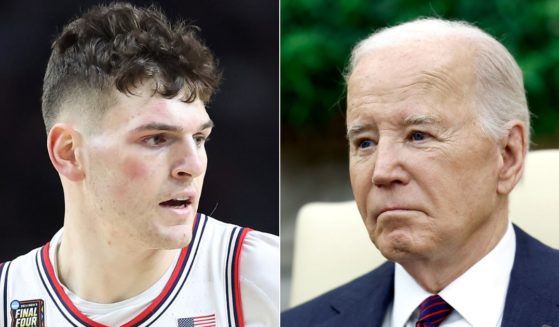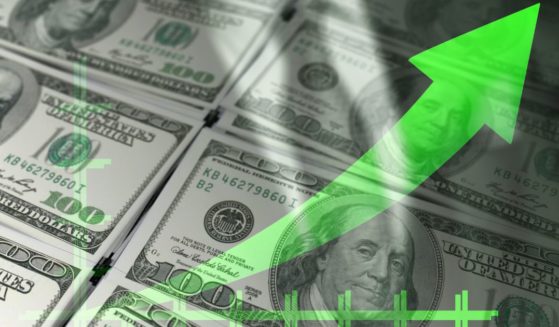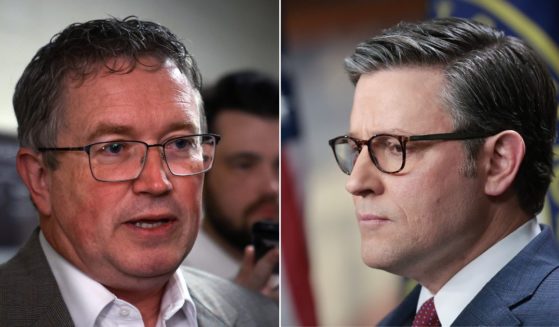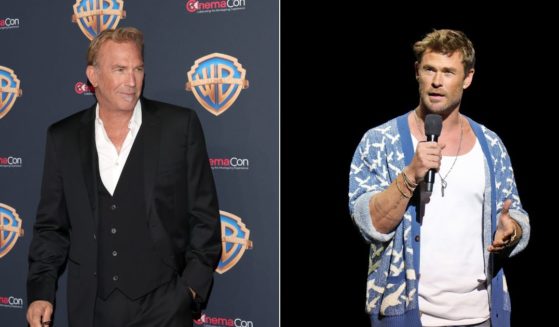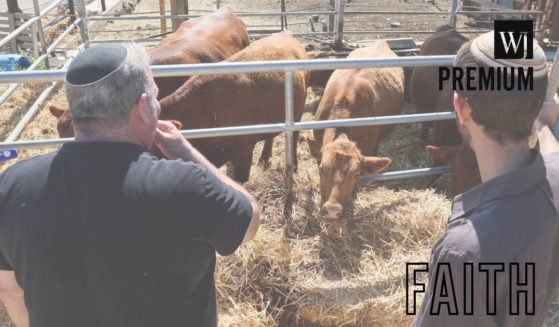Remembering Ronald Reagan on the 15th Anniversary of His Death
Few presidents enter the pantheon of the greatest in American history, but Ronald Reagan is definitely among their ranks.
Wednesday, June 5, marks the 15th anniversary of the 40th president’s passing in 2004, when the nation paused and gave him a coast-to-coast send off worthy of a leader who had not only positively and profoundly impacted the life of the country, but also the world.
A recent survey of noted historians conducted by C-Span found Reagan to be once again in the top 10 presidents, having moved up two spots over the past two years.
Lee Edwards — a historian with The Heritage Foundation and author of “The Essential Ronald Reagan” — told The Western Journal that Reagan was unequivocally the greatest president of the second half of the 20th century for three reasons.
“He restored Americans’ confidence in themselves and the nation, after a prolonged psychological depression that lasted from Vietnam to (President Jimmy) Carter,” Edwards said.
“He sparked an unprecedented period of economic prosperity, favoring every American, through historic tax cuts and deregulation,” he added.
Edwards also explained how Reagan, through building up the U.S. military and the Strategic Defense Initiative “won the Cold War at the bargaining table rather than the battlefield.”
“You can properly say that his presidency and what followed into the 21st century marked the Age of Reagan,” he concluded.
When running for president in 2008, then-candidate Barack Obama pointed to Reagan as someone who changed the “trajectory of America,” putting the country “on a fundamentally different path.”
In town hall on Fox News last week, South Bend, Indiana, mayor and Democratic presidential candidate Pete Buttigieg referred to the early 1980s as the “dawn of the Reagan era,” which lasted for the next four decades.
I came of age politically during the Reagan’s time in office. I remember speaking on his behalf in our all-middle school mock election in 1980 — which he won handily I might add.
Reagan later became my commander-in-chief when I entered West Point as a cadet in 1985. I was thrilled to see him face-to-face a few years later when he came to the academy to deliver an address regarding relations with the Soviet Union, including ongoing nuclear weapons reduction talks.
That visit came only months after his speech in front of the Brandenburg Gate in Berlin on June 12, 1987, during which he famously said: “Mr. Gorbachev, tear down this wall!”
The Berlin Wall — built starting in 1961 — divided the communist, Soviet-controlled sector of East Berlin, with the democratic, free western sector of the city.
While on an Army assignment in Germany in the summer of 1988, I traveled to Berlin crossing through Checkpoint Charlie, the portal between the West and the East.
Michael Reagan told The Western Journal one of the main reasons his father ran for president after serving two terms as California’s governor in the late 1960s and into the mid-1970s was because he grew weary of watching past American leaders always giving in to Soviet demands in an attempt to improve relations between the two nations, which became known as the policy of “detente.”
“He said for too long he had watched American presidents sit down with secretary generals of the Soviet Union, and every time they sat down, the Soviet Union asked the American president give up something to get along with them,” Reagan recounted.
“And he said I wanted to be the first president elected to sit down with the secretary general of the Soviet Union and while he was telling me what I was going to have to give up to get along with him, I was going to get up from my chair, walk around the other side of the table, lean over and whisper in his ear, ‘Nyet.’”
President Reagan did just that at a summit with Secretary General Mikhail Gorbachev in Reykjavik, Iceland, in October 1986 when he refused the communist leader’s demand to give up the Strategic Defense Initiative missile defense program in exchange for both sides agreeing to reduce the overall numbers of nuclear weapons.
The objective of the SDI program, dubbed “Star Wars,” became the basis of the missile defense system currently guarding America’s shores.
Reagan and Gorbachev would go on to sign the Intermediate-Range Nuclear Forces Treaty in December 1987, which resulted in the removal of an entire class of nuclear weapons.
Great to be back in #Berlin for the 1st time in 30 yrs! June 1988 – June 2018 #BerlinWall down! @WestPoint_USMA pic.twitter.com/XNkcqNvmJO
— Randy DeSoto (@RandyDeSoto) June 30, 2018
Floyd Brown — who was a member of Reagan’s 1980 campaign staff and served in his administration — pointed to the former Hollywood star’s faith in God as central to the impact he had.
“President Reagan at his core had a strong and abiding faith in God Almighty and that translated into a belief that God was in control of men’s lives,” he said. “That God was in control of nations’ lives. He looked at America as a place that was guided by God’s providence.”
Michael Reagan shares this assessment.
In the foreword to “Hand of Providence: The Strong and Quiet Faith of Ronald Reagan” by Mary Beth Brown, published just months before the former president’s death, Michael related that his father loved God and sought to fulfill the Lord’s will for his life.
“When he decided to run for president, he didn’t do it to raise himself up, to be admired, or to have others think he was great,” Michael wrote. “He didn’t do it out of selfish reasons or because it was the most powerful position in the country. He did it our of duty.
“He believed God had called him to be president. He believed God had things for him to do.”
This sense of divine calling was fortified after Reagan narrowly survived an assassination attempt just 69 days after taking office in 1981.
The shooter’s bullet punctured the president’s lung and stopped less than an inch from his heart, having just missed his aorta. Doctors attending him briefly could not detect a measurable blood pressure or pulse, as he had lost one-third of his blood supply.
Reagan later recorded in his diary as he struggled to breathe after reaching the hospital, he prayed and forgave his would-be killer, explaining, “I realized I couldn’t ask for God’s help while at the same time I felt hatred for the mixed up young man who had shot me. Isn’t that the meaning of the lost sheep? We are all God’s children & therefore equally beloved by him.”
“Whatever happens now I owe my life to God and will try to serve him in every way I can,” Reagan wrote.
In her book, “When Character Was King,” Peggy Noonan, who was a speechwriter for Reagan, recalled a conversation she had with former Reagan Deputy White House Chief of Staff Michael Deaver about the impact of surviving an assassin’s bullet had on the president.
“I know from the conversations he and I had after the assassination attempt that there was no question in his mind that his life had been spared. He absolutely believed it.
“He felt the Lord had spared him to fulfill whatever mission it was that he was supposed to fulfill. And he was going to make sure that he lived his life to the fullest and did whatever he considered to be the right thing for the rest of his life.”
I was living in Los Angeles, just about two miles down the road from Reagan when he passed in 2004.
I was walking near the campus of the University of California, Los Angeles, when I saw a news truck zip by on Sunset Boulevard. Soon there were news helicopters overhead too, and I wondered what was going on. Those were the days before the wide proliferation of smartphones.
As I made it back to my apartment building, my neighbor called out from his balcony, “Did you hear? Ronald Reagan just died.”
There had been reports the 93-year-old’s health was rapidly failing, so it wasn’t too surprising. But the outpouring of support, not only in California, but around the country was something to behold.
I was among the many who placed messages, flowers and other mementos in front of the Santa Monica funeral home where Nancy Reagan and the rest of the family came to begin the week during which the nation would say their goodbyes to The Gipper.
I joined the approximately 105,000 (over the course of three days) who made the pilgrimage to the Reagan Presidential Library about 40 miles north of Los Angeles to view his casket and pay respects. There were people of all demographics among the crowd: young, old; black, white, brown; rich and poor.
I then was on-hand with the throngs of people lining the roads and highways of southern California as the funeral procession made its way to the late president’s resting place after returning from Washington, D.C.
Fifteen years earlier in January 1989, Reagan said his own goodbye to the nation as chief executive, delivering his farewell address from the Oval Office.
I was in the middle of my senior year at West Point and was truly sad to see him go.
In his remarks, which I remember watching live, he spoke about some of the achievements of his administration, such as the revival of the nation’s spirit, the vast expansion of the American economy, and the thawing of the Cold War.
“We meant to change a nation, and instead, we changed a world,” he said.
The president concluded with a memorable line, particularly for me as someone in the military.
“My friends: We did it. We weren’t just marking time,” Reagan said. “We made a difference. We made the city stronger, we made the city freer, and we left her in good hands. All in all, not bad, not bad at all.”
Truth and Accuracy
We are committed to truth and accuracy in all of our journalism. Read our editorial standards.






